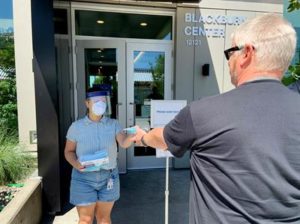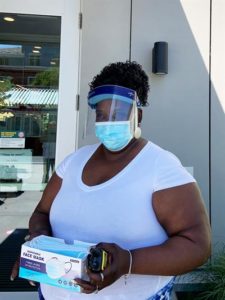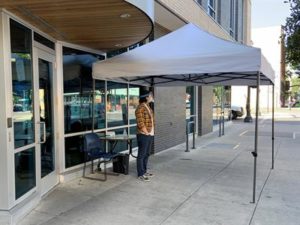This content block does not have a preview.
We’ve had to innovate rapidly in response to COVID-19. Our second National Health Center Week spotlight is on the staff who screen and treat patients with COVID-like symptoms. Our screeners and COVID triage clinic teams play a big role in keeping our facilities safe and reducing the spread of the virus.
The COVID-19 pandemic has changed Central City Concern’s operations, but it hasn’t slowed them down.
CCC’s clients, patients and residents — more than 13,000 people across the greater Portland area — depend on CCC for health care, housing, employment and more. And while many health services are now taking place over the phone or online, some care must still happen face to face. That includes everything from picking up medications to receiving medical care for acute conditions.
They say necessity is the mother of invention – and we’ve had to innovate rapidly
said Lauren Land
These days, when patients arrive to CCC’s health clinics for face-to-face care, they’re greeted by a new kind of welcoming committee. At Old
Town Clinic, Old Town Recovery Center and Blackburn Center, a group of employees screen all patients for COVID-like symptoms or exposures before they enter the building.
Anyone with concerning symptoms or potential exposures to COVID-19 is directed to a separate entrance.
From there, they are guided to an isolated space — called the COVID triage clinic — where another group of CCC providers assess the patient and determine whether a COVID-19 test is needed.

Nastya Gallagher distributes face coverings and screens patients for COVID-like symptoms at the entrance of the Blackburn Center health clinic. COVID screeners and care providers in the COVID triage clinics have played an essential role in protecting the safety of patients and CCC staff during the pandemic.
“They say necessity is the mother of invention – and we’ve had to innovate rapidly,” said Lauren Land, Associate Medical Director of Primary Care at Old Town Clinic.
That innovation has meant a complete overhaul of the way CCC’s health clinics provide care, so they could continue to do it as safely as possible.
A large part of that overhaul depended on the flexibility and dedication of clinic staff.
“In the beginning, none of us knew what this was going to look like. We didn’t know if the NYC surge was going to happen in Portland, too. Staff stepped up right away, with flexibility and grace under pressure,” said Land.
Some clinic employees have been reassigned to work exclusively as COVID screeners and in the triage clinics. Others rotate through these roles while still performing their regular jobs.

COVID screeners control the flow of people into CCC’s health clinics. Melody Barber screens any individual entering building, hands out free face masks to patients and receives mail deliveries in order to reduce the number of people going in and out.
Nastya Gallagher is usually a front desk receptionist at Blackburn Center, but she has worked as a screener nearly every day since March.
For Nastya, the main challenge has been clear communication with patients.
“I want folks to know that I’m going to make this short and sweet, and that they’ll still get the care they need,” Gallagher said. “But with a mask and face shield on, it’s so much harder to signal that I’m on the patient’s side. I still want to establish a relationship, build trust and normalize the process for folks.”
Blackburn Front Desk Supervisor Shane Durham has been working to make the screening process more accessible and approachable for a client population that has often had traumatizing experiences with health systems.

A rare quiet moment for screener Rene Stewart outside the Old Town Recovery Center (OTRC). Screeners at Old Town Clinic, OTRC and the Blackburn Center usually interact with around 200 patients each day.
“We had to think about how patients would feel if they were faced with a person in a mask, gloves and face shield,” he said. “We wanted to be able to get the information we need, but in a trauma-informed way.”
A rare quiet moment for screener Rene Stewart outside the Old Town Recovery Center (OTRC). Screeners at Old Town Clinic, OTRC and the Blackburn Center usually interact with around 200 patients each day.